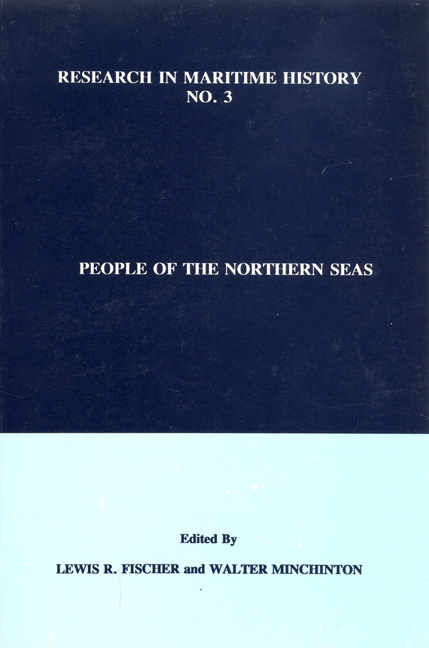Book contents
- Frontmatter
- Contents
- About the Editors
- Contributors
- General Introduction
- “Une Petite Republique” in Southwestern Newfoundland: The Limits of Imperial Authority in a Remote Maritime Environment”
- “Changes in Aleut Communities Following Russian Contact”
- “Five Years Before the Mast: Observations on the Conditions of Maritime Labour in Finland and Elsewhere”
- “Expressions of Longing, Sources of Anxiety? The Significance of Contacts with Home for Finnish Sailors in London and Hull in the Late Nineteenth Century”
- “Death of a Merchant”
- “St. Petersburg's Bills of Exchange in the Russian Economy of the Eighteenth Century”
- “Shipowners and Iron Sailing Ships: The First Twenty Years, 1838-1857”
- “The Growth of Norwegian Shipbroking: The Practices of Fearnley and Eger as a Case Study, 1869-1914”
- “Captain John Deane: Mercenary, Diplomat and Spy”
- “Her Majesty's Coastguard”
- “Coastal Life, ‘Nordic Culture’ and Nation State: Reflections on the Formation of the Nation State and Maritime History”
“Five Years Before the Mast: Observations on the Conditions of Maritime Labour in Finland and Elsewhere”
- Frontmatter
- Contents
- About the Editors
- Contributors
- General Introduction
- “Une Petite Republique” in Southwestern Newfoundland: The Limits of Imperial Authority in a Remote Maritime Environment”
- “Changes in Aleut Communities Following Russian Contact”
- “Five Years Before the Mast: Observations on the Conditions of Maritime Labour in Finland and Elsewhere”
- “Expressions of Longing, Sources of Anxiety? The Significance of Contacts with Home for Finnish Sailors in London and Hull in the Late Nineteenth Century”
- “Death of a Merchant”
- “St. Petersburg's Bills of Exchange in the Russian Economy of the Eighteenth Century”
- “Shipowners and Iron Sailing Ships: The First Twenty Years, 1838-1857”
- “The Growth of Norwegian Shipbroking: The Practices of Fearnley and Eger as a Case Study, 1869-1914”
- “Captain John Deane: Mercenary, Diplomat and Spy”
- “Her Majesty's Coastguard”
- “Coastal Life, ‘Nordic Culture’ and Nation State: Reflections on the Formation of the Nation State and Maritime History”
Summary
The grim living conditions of ordinary sailors, and the despotic discipline to which they were subjected, were integral parts of the Western maritime past. These unpleasant realities came to wide public notice for the first time in 1840 when Richard Henry Dana published his famous Two Years before the Mast. This book, which was followed by other more or less authentic descriptions, inaugurated a literary tradition that later included writers such as Herman Melville and Jack London. Although such books only seldom embodied true “voices from the forecastle,” they still comprise an extremely valuable stock of knowledge on which many scholars have relied. Recently, however, authentic documentary sources increasingly have been exploited to gain an even more accurate comprehension of living conditions before the mast.
Although the cruelty of maritime discipline sometimes closely resembled some of the features of slavery, it was not not always this way. Medieval maritime codes, such as the well-known Rôles d'Oleron, did not vest all power in the master; on the contrary, collégial rather than hierarchical relations were most typical. Common sailors had the right to express their opinions on important decisions and often their consent was required before the master could act. In coasting, deep-sea fishing and other traditional maritime trades egalitarianism and patriarchal rather than despotic discipline prevailed. It thus seems that masters with absolute power prepared to exercise “naval” discipline were a product of the early modern period, and that they only became the norm after a fairly protracted process of diffusion.
Marcus Rediker contended that the new system was quite fully developed at the end of the seventeenth century. Eric W. Sager, on the other hand, seems to believe that in Canada the transition occurred during the early nineteenth century (although he connected it with industrialization). It is certainly reasonable to presume that it may have started at the centre of the early modern maritime world and spread only gradually to more peripheral countries. Thus far, however, there seems little real evidence, apart from some general statements in older textbooks, on the origins of the new system, nor is it clear how uniform it was--in fact, it is difficult even to define its elements.
- Type
- Chapter
- Information
- People of the Northern Seas , pp. 47 - 62Publisher: Liverpool University PressPrint publication year: 1992

